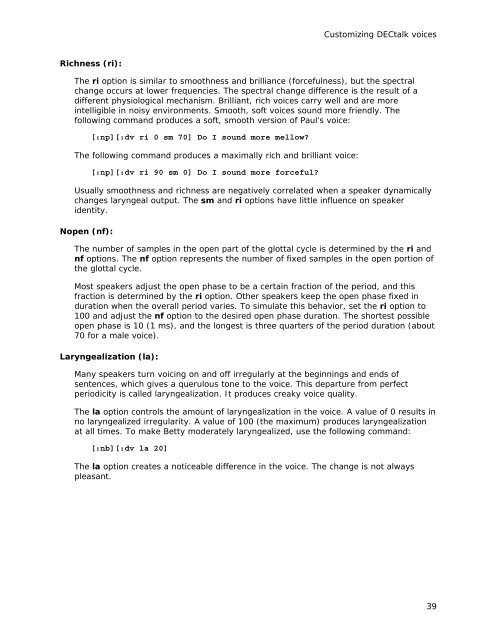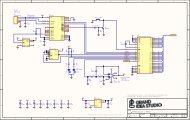Fonix proudly introduces DECtalk version 5.01-E1, the world's most ...
Fonix proudly introduces DECtalk version 5.01-E1, the world's most ...
Fonix proudly introduces DECtalk version 5.01-E1, the world's most ...
You also want an ePaper? Increase the reach of your titles
YUMPU automatically turns print PDFs into web optimized ePapers that Google loves.
Richness (ri):<br />
Customizing <strong>DECtalk</strong> voices<br />
The ri option is similar to smoothness and brilliance (forcefulness), but <strong>the</strong> spectral<br />
change occurs at lower frequencies. The spectral change difference is <strong>the</strong> result of a<br />
different physiological mechanism. Brilliant, rich voices carry well and are more<br />
intelligible in noisy environments. Smooth, soft voices sound more friendly. The<br />
following command produces a soft, smooth <strong>version</strong> of Paul’s voice:<br />
[:np][:dv ri 0 sm 70] Do I sound more mellow?<br />
The following command produces a maximally rich and brilliant voice:<br />
[:np][:dv ri 90 sm 0] Do I sound more forceful?<br />
Usually smoothness and richness are negatively correlated when a speaker dynamically<br />
changes laryngeal output. The sm and ri options have little influence on speaker<br />
identity.<br />
Nopen (nf):<br />
The number of samples in <strong>the</strong> open part of <strong>the</strong> glottal cycle is determined by <strong>the</strong> ri and<br />
nf options. The nf option represents <strong>the</strong> number of fixed samples in <strong>the</strong> open portion of<br />
<strong>the</strong> glottal cycle.<br />
Most speakers adjust <strong>the</strong> open phase to be a certain fraction of <strong>the</strong> period, and this<br />
fraction is determined by <strong>the</strong> ri option. O<strong>the</strong>r speakers keep <strong>the</strong> open phase fixed in<br />
duration when <strong>the</strong> overall period varies. To simulate this behavior, set <strong>the</strong> ri option to<br />
100 and adjust <strong>the</strong> nf option to <strong>the</strong> desired open phase duration. The shortest possible<br />
open phase is 10 (1 ms), and <strong>the</strong> longest is three quarters of <strong>the</strong> period duration (about<br />
70 for a male voice).<br />
Laryngealization (la):<br />
Many speakers turn voicing on and off irregularly at <strong>the</strong> beginnings and ends of<br />
sentences, which gives a querulous tone to <strong>the</strong> voice. This departure from perfect<br />
periodicity is called laryngealization. It produces creaky voice quality.<br />
The la option controls <strong>the</strong> amount of laryngealization in <strong>the</strong> voice. A value of 0 results in<br />
no laryngealized irregularity. A value of 100 (<strong>the</strong> maximum) produces laryngealization<br />
at all times. To make Betty moderately laryngealized, use <strong>the</strong> following command:<br />
[:nb][:dv la 20]<br />
The la option creates a noticeable difference in <strong>the</strong> voice. The change is not always<br />
pleasant.<br />
39








